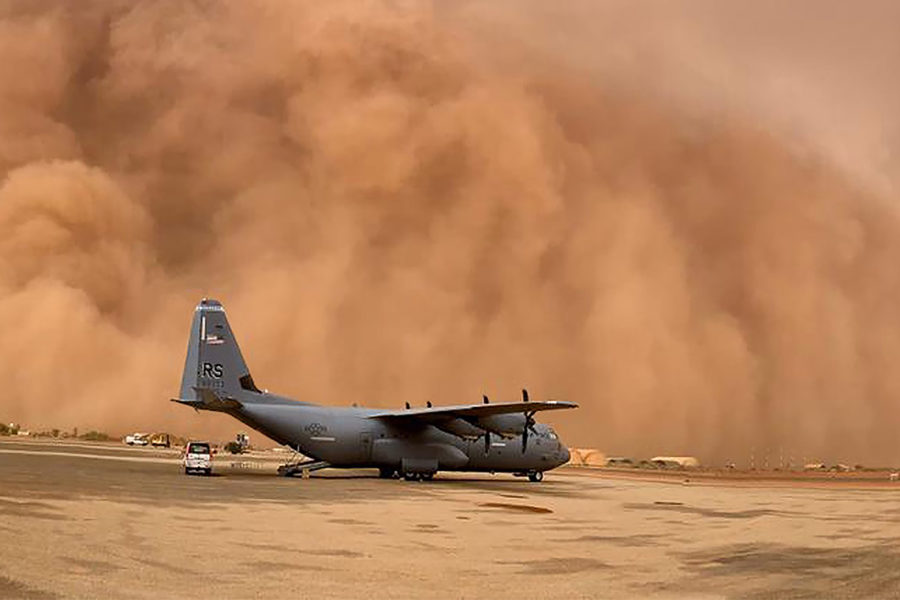The U.S. has shut down its last base in Niger, leaving a vacuum in America’s fight against terrorism in Africa, the Pentagon announced Aug. 5. For years, Niger and its air bases served as a critical hub for missions targeting extremist groups in the Sahel region.
The Pentagon announced the withdrawal of U.S. forces and assets from Air Base 201 in Agadez, in the central part of the country, in a joint statement with Niger’s defense ministry.
The U.S. withdrew from its other base in Niger, Air Base 101, near the capital of Niamey last month. Roughly two dozen troops still remain in Niger at the U.S. Embassy, Deputy Pentagon Press Secretary Sabrina Singh said Aug. 5
U.S. and Nigerian cooperation helped Air Base 101 and Air Base 201 become an intelligence hub where troops used drones such as MQ-9 Reapers to track militant groups, including al-Qaeda and affiliates of the Islamic State group. The U.S. was officially in the country to to train, advise, and assist Niger’s military, and the U.S. conducted joint operations with its military too.
U.S. Special Operations Forces fought alongside Niger’s military at times, and four American Soliders, along with four Nigerien troops and an interpreter, were killed while on the hunt for an Islamic State leader in 2017.
Air Base 201 was established in 2019, featuring an airfield capable of handling C-17 Globemaster landings. The site soon expanded to support additional ISR operations, with the Pentagon investing a total over $100 million in the base construction.
The U.S. has said it would leave insensitive materiel deemed impractical to move behind in Niger. The Pentagon referred questions on what materiel was left behind to U.S. Africa Command (AFRICOM), which did not immediately comment on the status of the equipment.
After Niger’s ruling junta scrapped a military cooperation pact with the U.S. in March, the military rulers ordered nearly 1,000 American personnel to leave the country by Sept. 15. The effort to close the two military sites began in May. The final U.S. Air Force C-17 departed Air Base 101 on July 8, AFRICOM said in a statement at the time.
“We’re still on track to meet that Sept. 15 deadline,” Singh said of the withdrawal. The Nigerien Ministry of National Defense has said it is committed to “the protection and security of American forces throughout the process,” according to AFRICOM.
From Air Base 101, the majority of the withdrawn troops were initially sent to Europe, while the rest were dispatched to other countries in West Africa. The U.S. Air Forces in Europe–Air Forces Africa did not immediately respond to a request for comment on where its flights out of the country headed off to.
Since Niger’s elected government was overthrown by a military junta in a coup in July 2023, the National Council for the Safeguard of the Homeland, known by its French acronym CNSP, took control. In the Sahel, Niger, Chad, and Burkina Faso have all had their governments toppled by coups since 2021. Chad, which has also housed U.S. troops, held troubled and violence-plagued presidential elections in May that confirmed its military ruler as the country’s leader.
The control of the two installations in Niger that have conducted years of Washington’s counterterrorism mission has now been returned to the Nigerien government.
“The effective cooperation and communication between the U.S. and Nigerien armed forces ensured that this turnover was finished ahead of schedule and without complications,” the statement read.
Still, concerns linger as to how Russia and Iran may potentially exploit Niger’s unrest. Recent coups in Africa have been followed by a further rise in jihadist violence and geopolitical tensions with Western security allies. U.S. officials have raised concerns about the Nigerien junta’s potential decision to grant Iran access to Niger’s uranium reserves for its nuclear program. Now the U.S. is searching for alternatives for its counterterrorism mission in the region.
“If Western operations are significantly impacted by this, it’s going to be bad for the Nigerien people,” retired Army Gen. Stephen J. Townsend, who led U.S. Africa Command from 2019-2022, told Air & Space Forces Magazine in August 2023, a month after Niger’s coup. “It’s going to be bad for the region. It’s going to be bad for Europe before it’s bad for America, but it’s going to be bad for everybody.”

